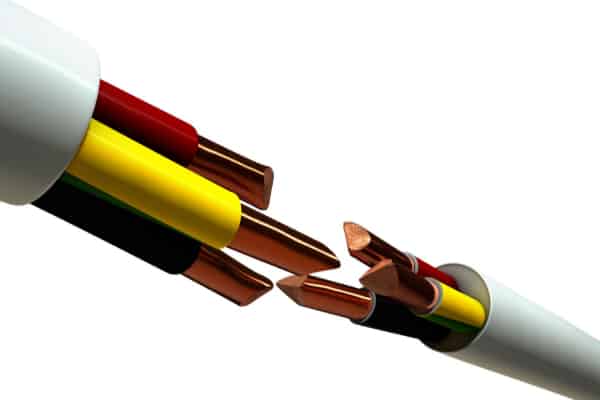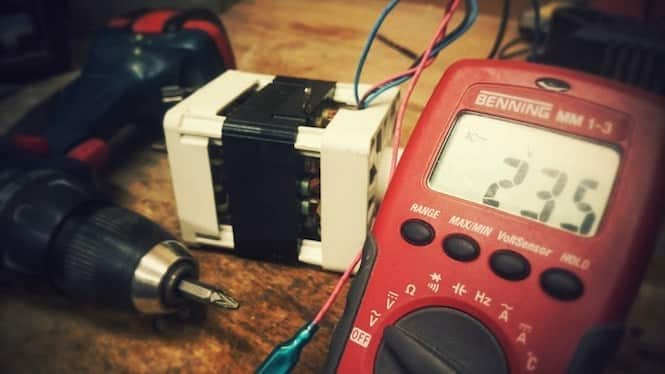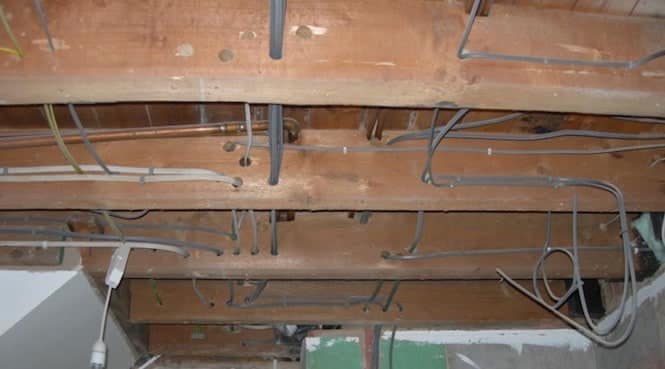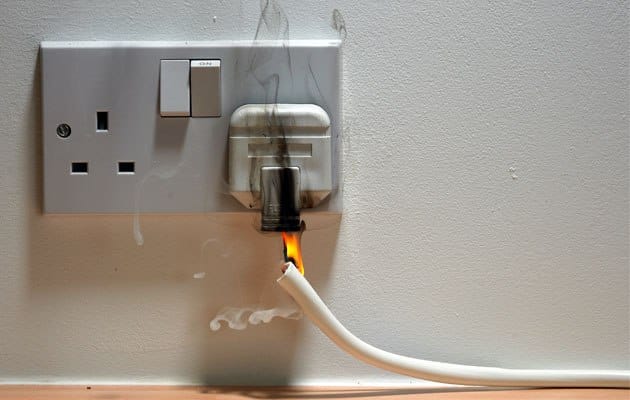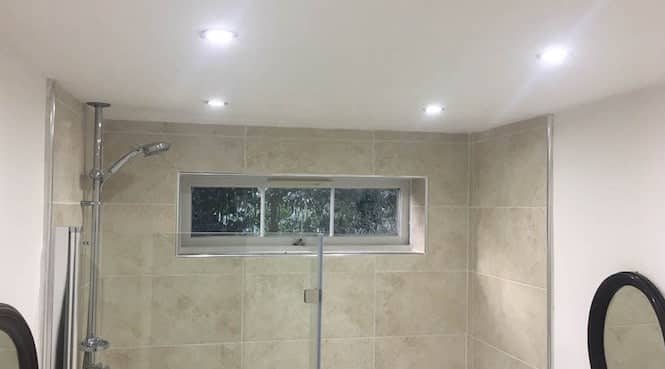Find My Local Expert What to do if You Find...
Read More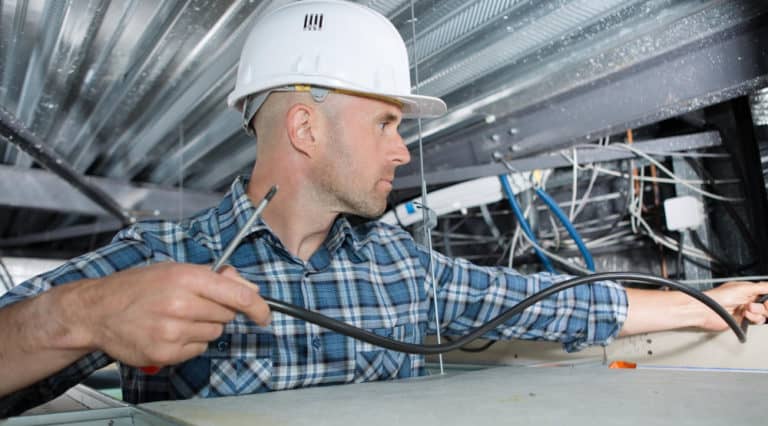
When is Rewiring my Property Necessary?
The wiring in your property can be a troubling thing when you start thinking too hard about it. It can be extremely dangerous when faulty, you don’t often get a lot of warning when there is a fault, and the wiring is mostly stuffed away behind walls and under floorboards where you can’t see it! Not the best combination of traits. Of course, if your property is residential, some of your wiring may be relatively easily accessible behind conduits, but the wires are still out of sight, meaning you’d still have to go looking for problems if you want to find them before something catches fire!
Of course, electrical wiring problems don’t tend to just spring out of nowhere. For the most part, you are unlikely to have any issues with the wiring in your walls over short time frames, which in this context could be years, even decades. We’ll get to longer time frames below.
The wiring in your walls shouldn’t be spending any time moving around. And, since electricity doesn’t cause any notable wear and tear on a wire—as long as that wire has enough capacity for the electricity it is carrying—there is really nothing to make the wire fail along those stretches where it is unbroken. Where the problems tend to arise are at the connection points, where wires connect to fixtures and switches and outlets. It is here where poor connections can be made, and where wires are tampered with the most.
But problems do sometimes arise in those hidden away stretches of wire. It could be that something small and furry with sharp teeth has got in there and had a nibble, or the result of water damage, or just because the wiring is very, very old. In the worst cases, you might find yourself needing your property rewiring, which is no small task.
Why Would I Need to Have my Property Rewired?
Rewiring a property is a substantial job, and not one you would undertake lightly, so what might lead you to take this course of action? The aforementioned hungry critter nibbling on your cables would be a nuisance, sure, but it wouldn’t typically lead to you rewiring the property, as the damage would probably be restricted to a relatively small area. The same applies to any kind of DIY accident, such as accidentally drilling through an electrical wire while hanging shelves.
Age
A properly installed wire that is rated correctly for the amount of electricity it is carrying will not cause you any problems in the relatively short term, as we mentioned above. There are no moving parts and the wire itself degrades very slowly.
But it does degrade.
Additionally, the insulation that protects the outside world from the dangerous electricity in the wires also degrades, often becoming hard and brittle, and can expose bits of wire over long enough time periods—typically decades.
If the wiring in your property was installed many decades ago, it may be in need of rewiring. Right now, any wiring that was installed from the 1960s onwards should be okay, assuming it was installed correctly and up to specification.
Usage Changes
We have mentioned a few times that the wiring should be okay as long as it is substantial enough for the amount of electricity it is carrying. Naturally, if the amount of electricity required changes, the capacity requirements of your wires will change also.
This would rarely require a full house rewire of the entire property, though you may find it to be the case that enough of your property needs rewiring that it makes sense to just have all of it done, giving you the peace of mind you get from knowing everything is up to scratch.
Renovations
A full renovation of a property will often involve “gutting” the property completely, which may expose the wiring anyway. When you combine this with the fact that you will often be moving wiring and fixtures around when you renovate a property, it starts to make sense that you might decide to rewire the property while everything is out in the open. And, of course, you can always just decide to do it for the peace of mind while the walls are down!
Damage
If your property sustains severe and widespread damage, such as would be the case in the event of a flood or other natural disaster, it would cast doubt on the safety of your electrical systems. In the case of flooding in particular, it would be outright dangerous to even attempt to use anything electrical without a very thorough inspection of the state of the wires and fixtures.
3 Warning Signs You Need a Rewire
We’ve talked about why you might want or need to get your property rewired, but what are the warning signs to look for? Assuming there is a problem with your wiring, and you are not just having the property rewired as a matter of course (such as you would with a renovation), there are some signs to look out for. We’ve picked three of the most common things you might be able to notice without tearing the walls down to get a closer look.
#1 Old Electrical Installations
If your outlets, switches, and any other electrical fixtures in your property are clearly from the 1950s (or before), it’s almost a certainty that the wiring in there will also be from that time. There will be an element of age on fixtures from this period regardless of how they look, but they will typically be clunkier, both in form factor and the feel of the switches. They are often black and feature curved edges, and may even be made of metal. Switches from this time also favoured a more knob-like lever-switch, rather than the flatter rocker-type switch we see today.
#2 There Has Been Serious Damage to the Property
As touched on above, if there has been substantial damage to your property, you may find rewiring necessary. The most obvious example of this kind of damage is flooding, which will see water getting behind the walls and into all the places you can’t see. Other examples include fire, severe wind damage, explosions, and anything else that causes damage to a large portion of the property.
In situations like this, it is important to get a professional to inspect your electrical systems before you even think about turning the power back on. There is a lot that could go wrong.
#3 Unexplainable Electrical Issues
If you have flickering lights, tripping breakers, or other electrical problems that cannot be resolved by any of the less invasive solutions, such as replacing breakers, outlets, fuses, switches, and appliances, then the problem may be down to your wiring.
Granted, it is unlikely that this kind of problem would just come out of nowhere, but if you have tried everything else, the wiring is certainly a potential culprit. At the very least, you will need a professional to come out and run some tests—unless you plan to start tearing the walls down and hoping you find the problem.
How Much Does Rewiring Cost?
The prices for this kind of work vary depending on size, but as a general rule, an average two-bedroom terraced house would cost between £2,500 and £3,500. Please note that this would not include any plastering or other aesthetic work once the wiring is done.
Are There Other Issues to Consider?
There are always other possible causes of electrical problems, such as poor connections at the outlets and switches themselves, faulty appliances, fuses, breakers, and RCDs. It certainly helps to get a professional opinion on matters before diving in with a full house rewire of your property.
If the reason you are considering a rewire is that you have established that your current wiring is very old and needs replacing, there isn’t really much else to consider, other than perhaps whether someone who owned the property before you had older electrical fixtures installed as a personal preference, but the wiring is still up to the required standards.
Can I Do the Rewiring Work Myself?
In the UK, there is no law that says you can’t carry out wiring from a fuse board in yourself. However, electrical work of this size would be notifiable, and would require proper certification from a qualified electrician when finished.
This is an important thing to note before starting, because the electrician needs to be able to verify that you have done the work to the necessary standards, and if they can’t verify because, for example, your work is behind a wall, they can’t sign off on it. If you are going to carry this work out yourself, be sure to get in touch with a qualified electrician beforehand so that you can establish what they will need to do when they inspect your work. It may be that they will need to be present throughout the process.
Hire a Professional!
Just because you can rewire your property yourself does not mean you should. Electrical systems can be dangerous, and it can be difficult to find an electrician willing to sign off on your work. Hiring a professional is nearly always the best course of action.
You May Also Like...
Guide on Electrical Inspection and Testing
Find My Local Expert A Guide about Electrical Inspection and...
Read MoreFull or Part House Rewiring
Find My Local Expert The 7 Checks You Can Do...
Read MoreElectrical Fault Finding
Find My Local Expert Understanding Electrical Fault Finding An electrical...
Read MoreDomestic Electrician Service
Find My Local Expert Full Domestic Electrician Service Whether you...
Read MoreNeed your Property Rewired?
My Trusted Expert Guarantee
Experts Have Been Vetted & Approved
